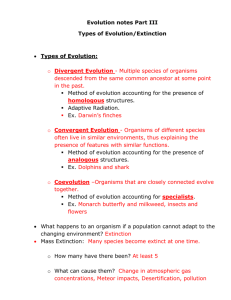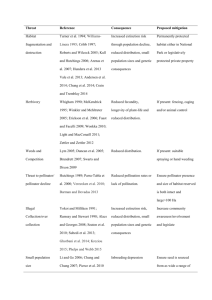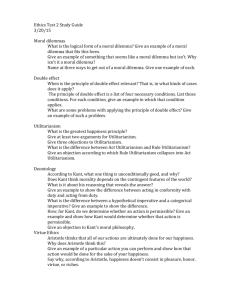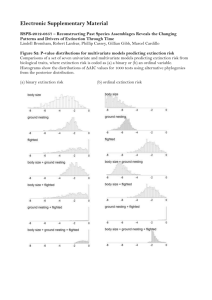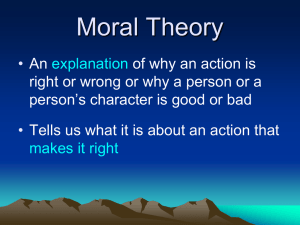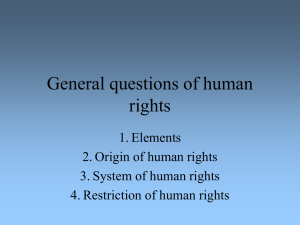CM Util Good DDI 2012 - Open Evidence Archive
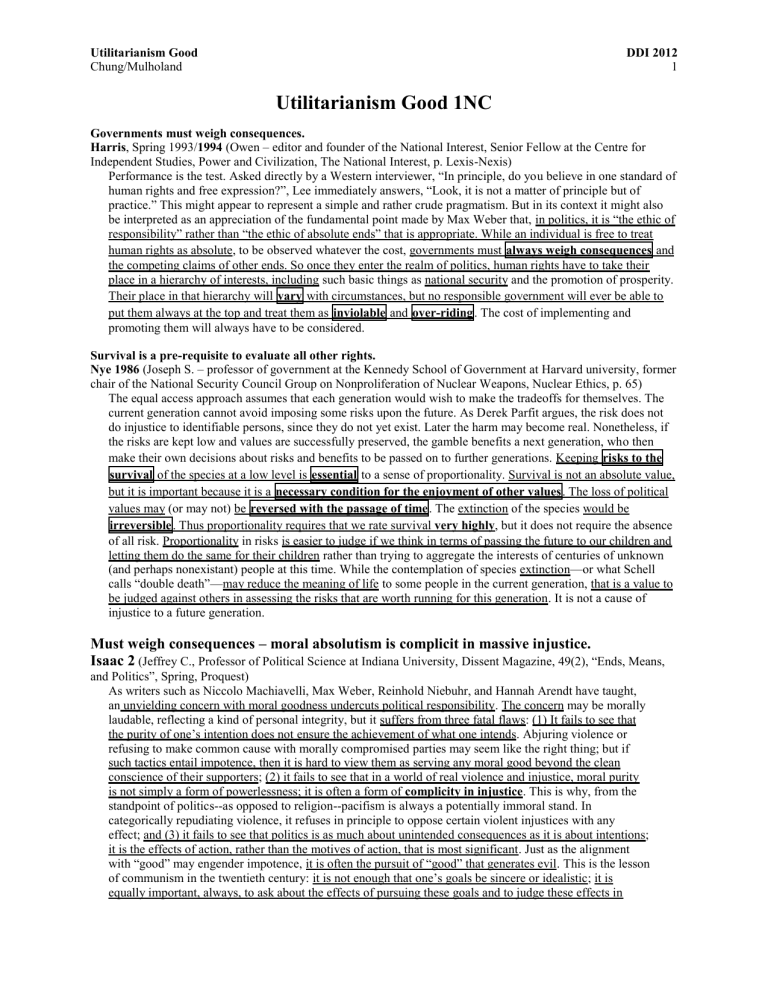
Utilitarianism Good
Chung/Mulholand
DDI 2012
1
Utilitarianism Good 1NC
Governments must weigh consequences.
Harris , Spring 1993/ 1994 (Owen – editor and founder of the National Interest, Senior Fellow at the Centre for
Independent Studies, Power and Civilization, The National Interest, p. Lexis-Nexis)
Performance is the test. Asked directly by a Western interviewer, “In principle, do you believe in one standard of human rights and free expression?”, Lee immediately answers, “Look, it is not a matter of principle but of practice.” This might appear to represent a simple and rather crude pragmatism. But in its context it might also be interpreted as an appreciation of the fundamental point made by Max Weber that, in politics, it is “the ethic of responsibility” rather than “the ethic of absolute ends” that is appropriate. While an individual is free to treat human rights as absolute, to be observed whatever the cost, governments must always weigh consequences and the competing claims of other ends. So once they enter the realm of politics, human rights have to take their place in a hierarchy of interests, including such basic things as national security and the promotion of prosperity.
Their place in that hierarchy will vary with circumstances, but no responsible government will ever be able to put them always at the top and treat them as inviolable and over-riding . The cost of implementing and promoting them will always have to be considered.
Survival is a pre-requisite to evaluate all other rights.
Nye 1986 (Joseph S. – professor of government at the Kennedy School of Government at Harvard university, former chair of the National Security Council Group on Nonproliferation of Nuclear Weapons, Nuclear Ethics, p. 65)
The equal access approach assumes that each generation would wish to make the tradeoffs for themselves. The current generation cannot avoid imposing some risks upon the future. As Derek Parfit argues, the risk does not do injustice to identifiable persons, since they do not yet exist. Later the harm may become real. Nonetheless, if the risks are kept low and values are successfully preserved, the gamble benefits a next generation, who then make their own decisions about risks and benefits to be passed on to further generations. Keeping risks to the survival of the species at a low level is essential to a sense of proportionality. Survival is not an absolute value, but it is important because it is a necessary condition for the enjoyment of other values . The loss of political values may (or may not) be reversed with the passage of time . The extinction of the species would be irreversible . Thus proportionality requires that we rate survival very highly , but it does not require the absence of all risk. Proportionality in risks is easier to judge if we think in terms of passing the future to our children and letting them do the same for their children rather than trying to aggregate the interests of centuries of unknown
(and perhaps nonexistant) people at this time. While the contemplation of species extinction—or what Schell calls “double death”—may reduce the meaning of life to some people in the current generation, that is a value to be judged against others in assessing the risks that are worth running for this generation. It is not a cause of injustice to a future generation.
Must weigh consequences – moral absolutism is complicit in massive injustice.
Isaac 2
(Jeffrey C., Professor of Political Science at Indiana University, Dissent Magazine, 49(2), “Ends, Means, and Politics”, Spring, Proquest)
As writers such as Niccolo Machiavelli, Max Weber, Reinhold Niebuhr, and Hannah Arendt have taught, an unyielding concern with moral goodness undercuts political responsibility. The concern may be morally laudable, reflecting a kind of personal integrity, but it suffers from three fatal flaws: (1) It fails to see that the purity of one’s intention does not ensure the achievement of what one intends. Abjuring violence or refusing to make common cause with morally compromised parties may seem like the right thing; but if such tactics entail impotence, then it is hard to view them as serving any moral good beyond the clean conscience of their supporters; (2) it fails to see that in a world of real violence and injustice, moral purity is not simply a form of powerlessness; it is often a form of complicity in injustice . This is why, from the standpoint of politics--as opposed to religion--pacifism is always a potentially immoral stand. In categorically repudiating violence, it refuses in principle to oppose certain violent injustices with any effect; and (3) it fails to see that politics is as much about unintended consequences as it is about intentions; it is the effects of action, rather than the motives of action, that is most significant. Just as the alignment with “good” may engender impotence, it is often the pursuit of “good” that generates evil. This is the lesson of communism in the twentieth century: it is not enough that one’s goals be sincere or idealistic; it is equally important, always, to ask about the effects of pursuing these goals and to judge these effects in
Utilitarianism Good
Chung/Mulholand
DDI 2012
2 pragmatic and historically contextualized ways. Moral absolutism inhibits this judgment. It alienates those who are not true believers. It promotes arrogance. And it undermines political effectiveness.
Utilitarianism Good
Chung/Mulholand
DDI 2012
3
Ext – Governments Must Weigh Consequences
Governments need to weigh consequences instead of fixating on moral duty.
Goodin 1995 (Robert – professor of political theory and philosophy at Australian National University,
Utilitarianism as a Public Philosophy, p. 26)
The great advantage of utilitarianism as a guide to public conduct is that it avoids gratuitous sacrifices , it ensures as best we are able to ensure in the uncertain world of public policy-making that policies are sensitive to people’s interests or desires or preferences. The great failing of more deontological theories, applied to those realms, is that they fixate upon duties done for the sake of duty rather than for the sake of any good that is done by doing one’s duty. Perhaps it is permissible (perhaps it is even proper) for private individuals in the course of their personal affairs to fetishize duties done for their own sake. It would be a mistake for public officials to do likewise, not least because it is impossible. The fixation on motives makes absolutely no sense in the public realm, and might make precious little sense in the private on even, as Chapter 3 shows.
Utilitarianism Good
Chung/Mulholand
DDI 2012
4
Ext – Extinction Outweighs
The risk of extinction outweighs even if we cannot perfectly predict the results of the plan.
Seeley 1986 (Robert – Central Committee for Conscientious Objectors, The Handbook of Non-Violence, p. 269-
270)
Supporters of U. S. and Soviet nuclear policy have argued that projections of human extinction, extensive environmental damage, and so on are not conclusively established. This is true, but it does not follow, as nuclear supporters suggest, that we are thereby made morally free to choose our current suicidal policies . In moral reasoning prediction of consequences is nearly always impossible . One balances the risks of an action against its benefits; one also considers what known damage the action would do. Thus a surgeon in deciding whether to perform an operation weighs the known effects (the loss of some nerve function, for example) and risks (death) against the benefits, and weighs also the risks and benefits of not performing surgery. Morally, however, human extinction is unlike any other risk . No conceivable human good could be worth the extinction of the race , for in order to be a human good it must be experienced by human beings. Thus extinction is one result we dare not—may not—risk. Though not conclusively established, the risk of extinction is real enough to make nuclear war utterly impermissible under any sane moral code .
Utilitarianism Good
Chung/Mulholand
DDI 2012
5
AT: Utilitarianism is Exclusionary
Utilitarianism prevents zeroing out anyone.
Dworkin 1977 (Ronald – Professor of Law and Philosophy at New York University, Taking Rights Seriously, p.
274-275)
Utilitarian arguments of policy, however, would seem secure from that objection. They do not suppose that any form of life is inherently more valuable than any other, but instead base their claim, that constraints on liberty are necessary to advance some collective goal of the community, just on the fact that that goal happens to be desired more widely or more deeply than any other. Utilitarian arguments of policy, therefore, seem not to oppose but on the contrary to embody the fundamental right of equal concern and respect, because they treat the wishes of each member of the community on a par with the wishes of any other, with no bonus or discount reflecting the view that the member is more or less worthy of concern, or his views more or less worthy of respect, than any other.



